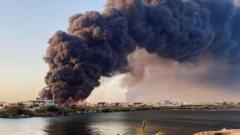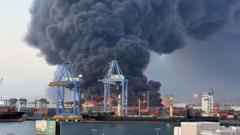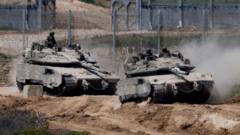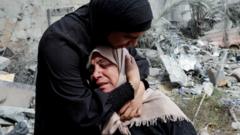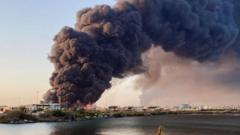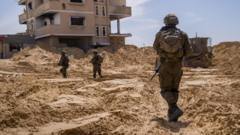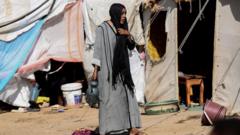Once a refuge from conflict, Port Sudan now grapples with skyrocketing water prices and blackouts after a week of violence from the Rapid Support Forces (RSF). Residents like Mutasim and Hawa Mustafa share harrowing tales of fear, escalating costs, and desperate search for safety as aid delivery is jeopardized.
Chaos in Port Sudan: A City on the Brink of Collapse
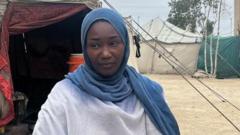
Chaos in Port Sudan: A City on the Brink of Collapse
Following a week of relentless drone attacks, Port Sudan faces acute water and power shortages, compounding the humanitarian crisis of the ongoing civil war in Sudan.
In a dramatic escalation of violence, Port Sudan is now struggling to survive after enduring a week of intense aerial attacks by the Rapid Support Forces (RSF), leading to a humanitarian crisis in the Red Sea port city. Known previously as a bastion of relative safety amidst Sudan's prolonged civil unrest, Port Sudan is reeling from devastating drone strikes on local fuel depots, which have rendered critical resources like water and electricity scarce.
The unprecedented attacks have caused routine pricing inflation, with the cost of a day's water supply skyrocketing from 2,000 Sudanese pounds ($3.30; £2.50) to nearly five times that amount. Mutasim, a 26-year-old displaced from Omdurman, describes the implications of such soaring prices, noting the challenge of providing for his family of eight. "Our financial situation is dire," he states, emphasizing the strain of sourcing water amid cascading costs.
Fuels to operate the pumps that extract groundwater are running low, compounding the crisis that has left families without adequate provisions for cooking and hygiene. The once-peaceful city has seen a resurgence of fear, as residents like Hawa Mustafa, a teacher and mother of four, recount the resurgence of violence and chaos reminiscent of their previous experiences in el-Geneina.
In the wake of this turmoil, humanitarian efforts face unprecedented hurdles. Port Sudan has served as a pivotal access point for aid distributions, including vital food assistance organized by the World Food Programme (WFP). However, with roads to aid supplies threatened, there is widespread concern about the impending challenges in delivering life-saving supplies.
With many residents confined to their homes due to fears of further conflict and incessant power outages, the city that once buzzed with life at night now experiences an eerie silence. As hopes for safety continue to dwindle, families find themselves grasping for any semblance of security amidst a situation spiraling out of control.






